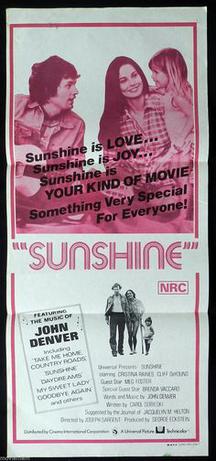| Sunshine | |
|---|---|
 Australian official theatrical release poster | |
| Genre | Docudrama |
| Based on | journal by Jacquelyn M. Helton |
| Teleplay by | Carol Sobieski |
| Directed by | Joseph Sargent |
| Starring | Cristina Raines Cliff DeYoung Meg Foster Brenda Vaccaro |
| Theme music composer | John Denver Hal Mooney |
| Country of origin | United States |
| Original language | English |
| Production | |
| Producer | George Eckstein |
| Running time | 125 minutes |
| Production company | Universal Television |
| Original release | |
| Network | CBS |
| Release | November 9, 1973 |
Sunshine is a 1973 American made-for-television docudrama, directed by Joseph Sargent and produced by George Eckstein, [1] about Kate Hayden, a young wife and mother who is diagnosed with cancer at age 20. The film stars Cristina Raines in the lead role of Kate (Raines' first big movie role), Cliff DeYoung as Kate's husband Sam Hayden, and twins Lindsay and Sidney Greenbush as Jill, Kate and Sam's daughter, as a toddler. It originally aired on CBS as an episode of the CBS Friday Night Movie on November 9, 1973. When first aired, Sunshine was the most watched made-for-TV film in history. [2] The film uses John Denver's song "Sunshine on My Shoulders" as a theme. The song "My Sweet Lady" from the film reached #17 on the Billboard Hot 100 Pop Chart in 1974, and #14 in Canada. [3]